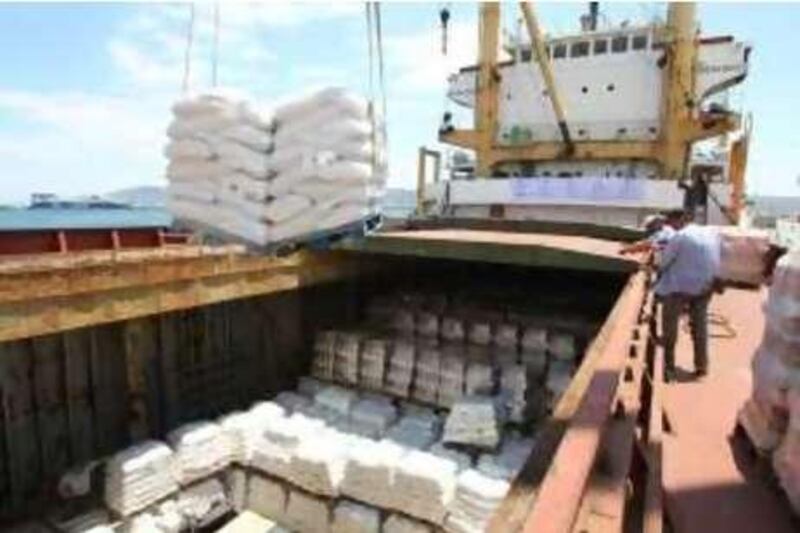NICOSIA // Israel, still reeling from the fall-out of its bloody commando raid on a Turkish aid vessel six weeks ago, was confident last night that it had thwarted a planned Libyan attempt to break its sea blockade of Gaza. Greek agents for a freighter chartered by a charity headed by Seif al Islam Qadafi, the second son and heir apparent of the Libyan leader, Muammar Qadafi, confirmed Israeli reports that it would sail to an Egyptian port instead of Gaza. The 92-metre Moldovan-flagged Amalthea, renamed Hope for the mission, is laden with 2,000 tonnes of food, cooking oil, medicines and prefabricated houses.
It set sail from the Greek port of Lavrio, 37 miles south-east of Athens, yesterday afternoon with a 12-man crew and nine passengers. Israel's hardline foreign minister, Avigdor Lieberman, made several calls in recent days to his Greek and Moldovan counterparts, urging them to prevent or divert the mission. Israel's defence minister, Ehud Barak, also appealed to Egypt's intelligence minister, Omar Suleiman, to "accept the boat" at Al Arish port, where the Hope was believed to be heading last night.
Israel's foreign ministry said in a statement that because of what it called "the talks" it believed "the ship will not reach Gaza". Israeli officials claimed that Moldovan authorities had contacted the ship's captain, who agreed to divert the ship to the Egyptian port of Al Arish. Israel also sought the United Nations' urgent intercession to stop the Libyan ship. "Israel calls upon the international community to exert its influence on the government of Libya to demonstrate responsibility and prevent the ship from departing to the Gaza Strip," Israeli's ambassador to the UN, Gavriela Shalev, said in a letter to Ban Ki-moon, the UN Secretary General.
Her letter warned that "Israel reserves the right under international law to prevent this ship from violating the existing naval blockade on the Gaza Strip". Adam Shapiro, a board member of the international Free Gaza Movement, said it was "unfortunate" that the Libyan-chartered ship had apparently agreed to sail alone to an Egyptian port. He said it should have waited to join a Free Gaza flotilla that plans to set sail directly to the Palestinian territory in September or October, with a fleet of about 10 vessels.
The US-based Free Gaza Movement, which organised most of the Gaza mercy flotillas since 2008, has vowed to send more ships. So have aid organisations in Iran and Lebanon. Speaking from Washington, Mr Shapiro said Israel was still holding the several ships it seized at the end of May when the Mavi Marmara was attacked. "But we have groups in the US, Canada, South Africa and other countries organising new ships and we hope to have 10 ready for the next freedom flotilla."
Israel's raid on the Mavi Marmara, a Gaza-bound Turkish ferry with 600 passengers, on May 31 proved disastrous. The vessel was heading a convoy of six ships and boats carrying a total of 10,000 tonnes of humanitarian supplies. Nine Turkish nationals were shot dead by Israeli special forces who arrived by helicopter and speedboat-borne and who claimed they were acting in self-defence. Post-mortems carried out by the Turkish state forensic institute, however, indicated that a total of 30 bullets were found in the bodies of the dead activists, including one who had been shot four times in the head. There were no Israeli fatalities.
The incident has damaged, perhaps irreparably, Israel's highly valued relations with Turkey, formerly its only non-Arab and Muslim ally in the region. In furious protest, Anarka has threatened to break diplomatic ties with the Jewish state and withdrawn its ambassador from Tel Aviv. Turkey is demanding an apology, an international inquiry into the raid, and Israeli compensation for the families of the Mavi Marmara victims. The Israeli government has agreed only to an internal investigation and insists it has nothing to apologise for.
Global outrage, however, spurred Tel Aviv to allow more goods into Gaza, although the sea blockade remains. Israel tightened its economic siege on Gaza three years ago when the militant group, Hamas seized control of the tiny and densely-populated coastal territory. Unemployment in Gaza is close to 40 per cent because of the punitive Israeli measures, the UN says. Aid agencies say building materials are desperately needed in Gaza as the blockade has prevented much reconstruction taking place since Israel's devastating 22-day military onslaught, which ended in January 2009.
An Israeli blacklist includes many so-called "dual-use" items that could be used to make weapons. Exports from Gaza are forbidden, making it impossible for the enclave's crippled economy to recover, while it is very difficult for Gazans to get Israeli permission to travel from the territory. mtheodoulou@thenational.ae
Gaza aid ship diverted to Egypt
Greek agents for a freighter chartered by a charity headed by the son of the Libyan leader confirmed Israeli reports that it would sail to an Egyptian port instead of Gaza.

More from the national




